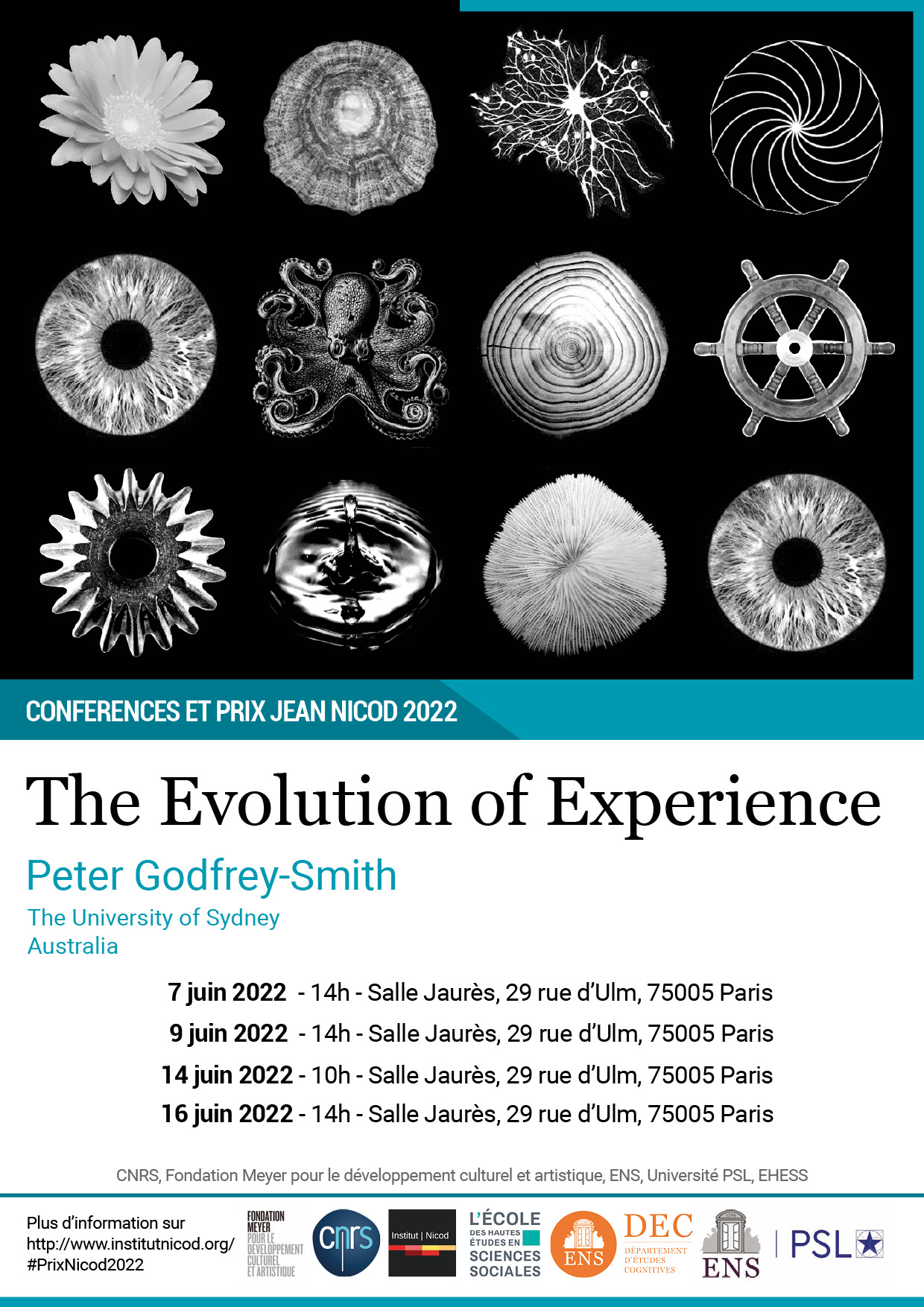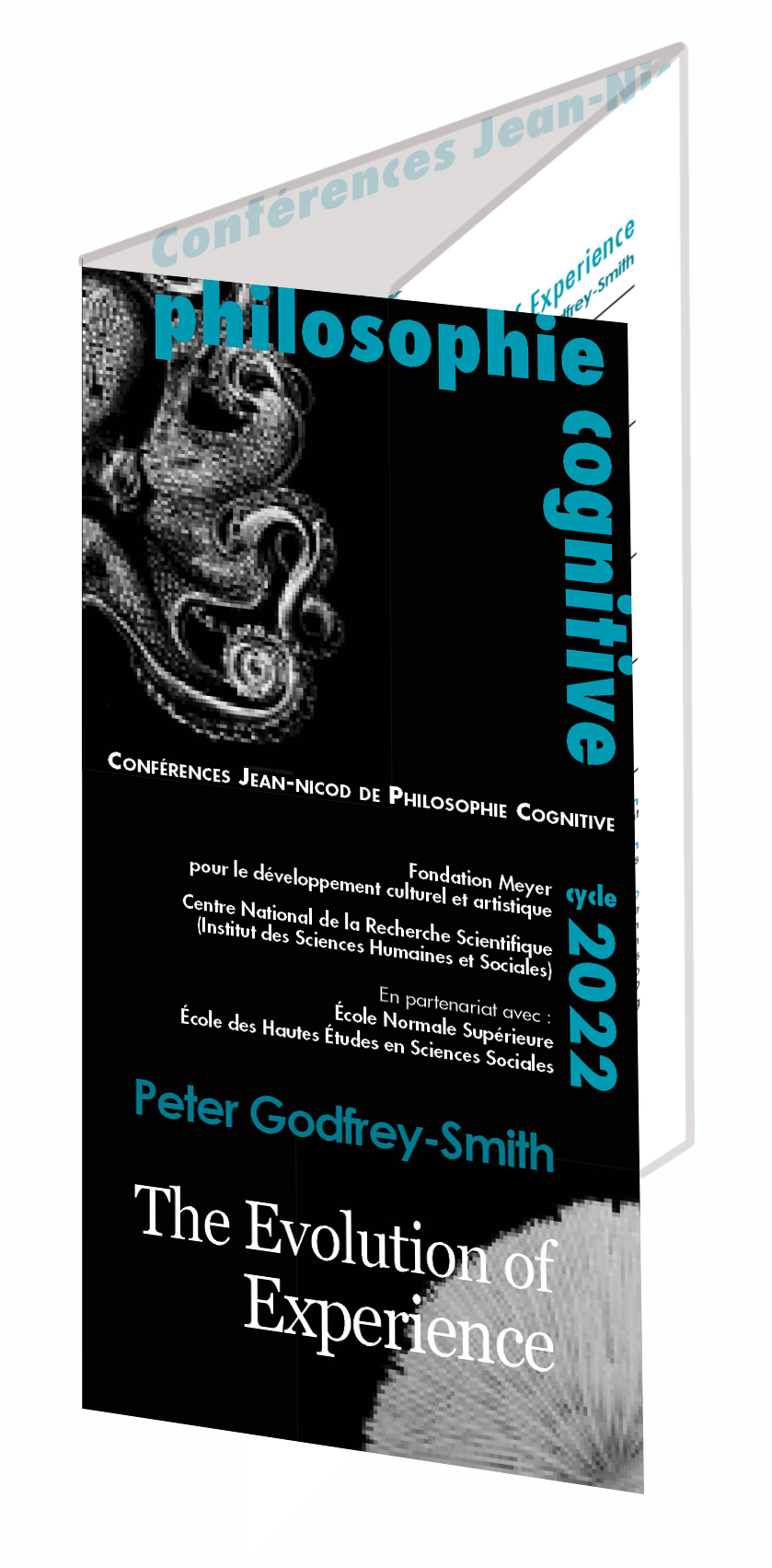Accueil > Séminaires/Colloques > Prix Jean Nicod > Conférences et Prix Jean-Nicod 2022 > Conférences et Prix Jean-Nicod 2022
Conférences et Prix Jean-Nicod 2022

Peter Godfrey-Smith est professeur d’histoire et de philosophie des sciences à l’université de Sydney, en Australie. Après avoir étudié à l’université de Sydney et à l’UC San Diego, il a enseigné à Stanford, à Harvard, à l’université nationale australienne et au CUNY Graduate Center avant de retourner à Sydney. Il a écrit six livres, dont Darwinian Populations and Natural Selection, qui a remporté le prix Lakatos 2010, et Other Minds : The Octopus, the Sea, and the Deep Origins of Consciousness, qui a remporté le prix Patrick Suppes en 2019. Son livre le plus récent est Metazoa : Animal Life and the Birth of the Mind.
|
|
Biological Explanation and Subjectivity
Remise du Prix Jean-Nicod et cocktail après la conférence
Mardi 7 juin - 14h
Ecole normale supérieure, Salle jaurès, 29 rue d’Ulm, 75005 Paris
The first part of this lecture will give an overview of the picture to be developed and defended across all four. My aim is to give an account of the evolutionary history of animals and nervous systems that makes sense of the origin of subjective experience (sentience, phenomenal consciousness). My account has some features of a "how possibly" explanation, but is intended to be empirically motivated. The second part of the lecture begins on some general questions of framing – materialism, monism, multiple realizability, concepts of experience and consciousness – that will continue in lecture 2. The boundaries between major topics do not exactly coincide with the boundaries between lectures, but I will try to ensure that each lecture remains self-contained.
Framework Questions, and a Start on the Evolutionary Sequence
Jeudi 9 juin - 14h
Ecole normale supérieure, Salle jaurès, 29 rue d’Ulm, 75005 Paris
This lecture will be initially concerned with stage-setting, outlining positions on materialism, reductionism, multiple realizability and related topics. It will also look at the mind-body problem itself, and changes in how the problem has been conceived over recent decades. Solving the problem will involve a combination of critical moves that take us away from conceptions of the problem that make it look harder than it really is, and more positive moves bridging an "explanatory gap" that remains after the critical rethinking. In the latter part of the lecture I will start exploring the early history of animal life.
The Evolution of Experience
Mardi 14 juin - 10h
Ecole normale supérieure, Salle jaurès, 29 rue d’Ulm, 75005 Paris
My account of the biological basis and origin of subjective experience has two elements. Part of the explanation is given in terms of the evolution of agency and subjectivity, as features of the animal way of being, and another part involves some particular characteristics of nervous systems. The evolutionary history of animals functions in my account as a constraint and a resource. I argue that there is probably a broad distribution of subjective experience across different kinds of animals, both past and present, though the usual "yes or no" question will probably have to be replaced in a framework that recognizes gradual change and graded presence. Some specific groups will be discussed, including cephalopods and various arthropods, as well as vertebrates.
Later Stages, Objections, and Alternatives
Jeudi 16 juin - 14h
Ecole normale supérieure, Salle jaurès, 29 rue d’Ulm, 75005 Paris
The first part of the lecture will complete, and summarize, my evolutionary account and the place of subjectivity within animal life. This will include a look at human consciousness, and later stages in the evolutionary story. The rest of the lecture will be concerned with possible objections, alternatives to my view, and my reasons for not following paths seen in other discussions (Dehaene, LeDoux, and others). I’ll also look at radically inclusive views – biopsychism and panpsychism – and at rejections of the possibility of a gradualist account of the origin of subjective experience.

Sélection bibliographique
- Metazoa : Animal Life and the Birth of the Mind. Farrar, Straus and Giroux, 2020.
- “Gradualism and the Evolution of Experience,” Philosophical Topics 48 (2020) : 201-220.
- “Evolving Across the Explanatory Gap,” Philosophy, Theory, and Practice in Biology 11 (2019) : 1.
- “The Evolution of Consciousness in Phylogenetic Context,” in K. Andrews and J. Beck (eds.), The Routledge Handbook of Philosophy of Animal Minds. London : Routledge, 2017, pp. 216-226.
- “Mind, Matter, and Metabolism,” Journal of Philosophy 113 (2016) : 481-506.
- Other Minds : The Octopus, the Sea, and the Deep Origins of Consciousness. Farrar, Straus and Giroux, 2016
- “An Option Space for Early Neural Evolution” (G. Jékely, F. Keijzer, and P. Godfrey-Smith), Philosophical Transactions of the Royal Society B, 370 (2015) 20150181







